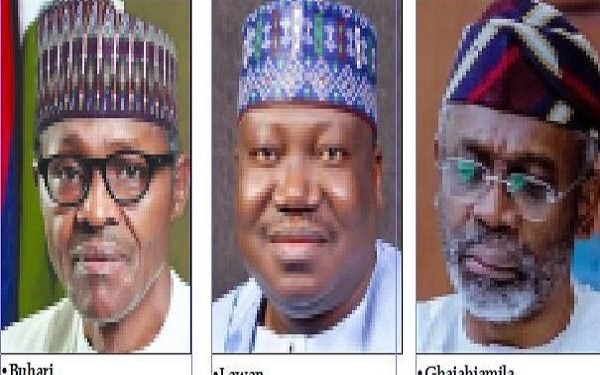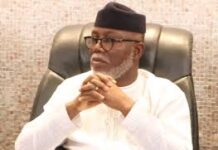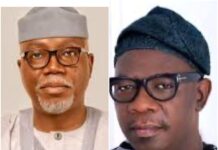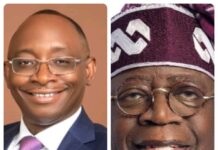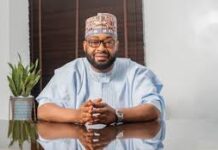Controversy Over Local Government Autonomy
POLITICS DIGEST – There have been agitations for the recognition of local council as the third tier of government in accordance with the provisions of the 1999 Constitution. Many have argued that governors have mismanaged local government funds through the joint state/local government account. In this report, TONY AKOWE examines the quest for local government autonomy as the National Assembly prepares to amend the constitution.
On assumption of office on May 29, 1999, former President Olusegun Obasanjo acknowledged the problem inherent in the 1999 Constitution. He asked the then three political parties represented in the National Assembly (the Peoples Democratic Party, Alliance for Democracy and All Peoples Party) to nominate six representatives each to constitute an All – Party Committee on the review of the constitution. That committee, which was later expanded to eight members each from the three parties, became the Presidential Committee on the Review of the 1999 constitution.
The committee, which was inaugurated on October 19, 1999 by the then Attorney General of the Federation and Minister of Justice, Chief Kanu Agabi, was initially headed by Ambassador Yusuf Mamman who was National Chairman of the Alliance for Democracy. He was later replaced by Chief Clement Ebri when Mamman resigned and was replaced on the committee by Chief Ayo Adebanjo. The committee pushed for a system of local government in the country, which would recognise the internal diversity of the country within a federal structure. In its wisdom, the committee argued that the safeguards which have been built into the system will guarantee that development of the states and local government areas will remain a joint responsibility of the tiers, with adequate autonomy reasonably satisfactory to each level.
The panel recommended that part of the constitution listing the names of local government should be deleted on the premise that “within the principle of a truly federal system, local governments are not federating units and should not be specifically mentioned in the constitution”.
The argument of the committee has a strong backing of the True Federalism Committee of the All Progressives Congress (APC). The El-Rufai Committee on True Federalism believes that local government should not be listed in the constitution. In its recommendation, which the party forwarded to the National Assembly during the 8th Assembly, the committee acknowledged that the demand for local government autonomy was as a result of the alleged interference in the management of the money allocated to LGAs from the Federation Account. They said “Local Governments cannot be federating units under the principles of federalism, thereby making the whole notion of direct allocation to LGAs from the Federation Account an aberration. In conformity with federalism, LGAs should be no more than administrative units of states as otherwise would make them become third tier federating units. In view of these, and in line with empirical findings during consultations, the committee recommended that LGA should be removed from the constitution and states be allowed to develop a local administrative system that is relevant and peculiar to each respective state”. This then brings to mind the question of whether the local government system is really necessary in the country, if they cannot be guaranteed freedom to operate like any other tier of government.
Part of the recommendation of the Constitution Review Committee set up by Obasanjo was that while Local Governments should be relatively autonomous as provided for in the Constitution and subject to direct funding and minimal supervision by the State Governments in specific matters. There are however arguments that the demand for a Local Government system with a constitutional power to deal directly with the Federal Government amounts to a violation of the constitutional sovereignty of states and to a large extent, renders the states completely irrelevant as federating units.
Although the local government system is a creation of the constitution, there are agitations that states should be empowered to legislate on the existence of local government. But, others have argued that doing this will only make the local government councils an appendage of the governor’s office. Across the country, there are allegations that local government allocation is siphoned monthly by state governors. Many local government councils across the country can hardly pay workers’ salaries, while other have not been able to execute a single project for years.
Deputy Speaker of the House of Representatives, Ahmed Idris Wase said the system should be given all that it required to function as a full tier of government as was envisaged by the constitution. He said a functional local government system will address the security challenges in the country. He said: “as for me, first as a member of parliament representing my constituency and my people, I think I am on the same page with my constituents to have an autonomous local government system, anchored on the generosity of what the President has done.
If you remember sometime past, he signed an Executive Order to have financial autonomy for local government. It is not just about financial autonomy; we should also have a complete independence of their administration, apart from their finances. That is the only way it can work, to make Nigeria and Nigerians great. My dream for this country is to have a very sound, viral working local government system.
“When that one is achieved in Nigeria, I want to say all the security challenges we are having in this country will be solved. I come from one of the remotest part of this country. I know how local government administration was then in the past, not the one we are having today and I believe collectively all of us we can make it work again. We can change the narration, we can make it better. We need to appreciate and understand what we swear to uphold. But, are we really upholding what we swear to do? Part of the misgivings of this country is that 70 percent of the people don’t know the contents of the Constitution”.
Read Also:
Minority Leader of the House, Ndudi Elumelu also threw his weight behind local government autonomy, saying however, that it requires a lot of lobbying to achieve the autonomy. He said: “What we need is lobbying. However, let me say that one of the States that voted for local Government autonomy was Delta State. My Governor supported it the last time when it came in 2015 to 2019 amendment/alteration of the constitution. About 10 State Houses of Assembly supported it then and Delta state was one of them. So the issue about my state voting for it again is not in doubt. It’s now left for other States to know that there is need for them to emulate what Delta has done by supporting it. So, if Delta State can support it, I don’t see any other state that shouldn’t support local government autonomy”.
Also, the 2014 National Conference recognized the Local Governments as a layer of governance closest to the people and a platform for sustainable socio-economic development and popular participation in governance at the grassroots. As important as it seems, delegates observed that the tier of government has been abused by state administrators. They believe that in tandem with the practice of a true federal system, there was the need for some safeguards that will guarantee the independence of local government. However, the National Conference said that Joint states/local government account should be scrapped and in its place, there should be a State Revenue Mobilisation, Allocation and Fiscal Commission (SRMAFC) with representatives of Local Governments and a Chairman nominated by the Governor be established. They also recommended that in “allocation of funds to the State Government, Local Government Councils and between Local Councils of a State, each SRMAFC shall apply the same distribution principles for Revenue Allocation Formula adopted by RMAFC to allocate fund from the Federation Account”.
Speaker of the House of Representatives, Femi Gbajabiamila said the local government should be granted financial autonomy. He called for constitutional amendment to actualise it. The Speaker said autonomy was the only way people at the grass roots could enjoy the benefits of government. Gbajabiamila said: “I know for sure the issue of autonomy has to be taken from the constitution itself.
There is nowhere in the whole world where you have the listed number of local governments in their constitution except in this country. Ab initio that is a failure on our part as a result because of the military decree that established that constitution and it is subject to be amended.
By the time we want to amend it, we should take it off completely from local government and make sure we have democratically elected local government in place without putting the list of the number of local governments in the constitution. Therefore there would be freedom, there would be independence, people would vote for people of their choices and the result would be made available. In order for us to do that, there is need for us to amend the constitution of this country, take away the issue of putting local government names in our constitution.
Take it off completely. Allow the local government to be embedded in the constitution as an establishment on its own without numbering of 774 local government areas. If you do that, you have restricted the number of local governments to be created. You have restricted the power of people. You have restricted the power of people, you have restricted the control people, therefore the independent cannot be absolute. In order not to allow that to happen, what you need to do is to ensure that there should be an established local government in place which shall be controlled by democratically elected governments and there would be freedom for them’’.
But, the Speaker said the National Assembly cannot salvage the local government system unless the people make a conscious decision to have autonomy for the council. The Speaker said the people have the opportunity to decide what type of local government system they want through the ongoing constitutional amendment. He said: “It’s not for us as legislators to do that. I’m sure you’re surprised. But, it’s actually for the people to address. We have constitutional amendment, we will throw it to the people and they will make their decision. We did it the last time and went back to the states as required by the constitution. But, we couldn’t get the 2/3rd. There is a process and we followed due process. We amended it last time but 2/3rd of the states did not agree with us.
“So it’s the people that will decide whether they want autonomy or not. We will do what we need to do as constitution provides.
“The foundation of democratic governments in Nigeria. Ideally, it ought to be the center of governance activities and government innovations that serve to improve quality of life for all Nigerians.
“The system we have in place now has not served as well because of obvious overemphasis on the centralized policy planning and implementation at the federal government level. We have an obligation to try as much as we can to change the status quo in favour of an alternative that serves present needs and meets future expectations”.
President of the Chartered Institute of Local Government and Public Administration of Nigeria, Prof Kunle Awotokun, said local governments must be ready for accountability, if granted autonomy. He said states have abused the joint account with the local governments by hijacking money meant for the local governments. “the state governments have embarrassed the whole nation by hijacking money meant for local governments through the instrumentality of states, local government, joint accounts. They have abused it, there is no doubt about it. If they had not abused it, the previous arrangement would have been okay as a matter of protocol, decency and courtesy, that you don’t reach a local government directly from the federal, when are not running a unitary system of government. Since 1999 almost the state governments have abused the state, local government joint account and that is why, Mr. President is trying to look at it from other perspectives”.
The Registrar of the Institute, Dr Uche Okereke, said “Over the years, the local government system and public administration system has not been properly professionalized, but we thank the President of the Federal Republic last year, he assented to the Bill establishing this Institute making it the only professional body exclusively for local government employees and public administration. Without the local government system in Nigeria, the country would not move forward as expected. Most of the problems being faced today in Nigeria is as a result of problems we have in the local government. With an effective local government system, politically, security wise, financially, we would have a strong government. So government at the grassroot is the bedrock for rural development and that is why we are championing local government autonomy.”
The House of Representatives is however considering a bill to grant autonomy to the local government as part of its constitutional review process. The bill is sponsored by Hon. Dachung Musa Bagos (PDP, Plateau) was earlier passed by the 8th Assembly but failed failed to get the mandatory concurrence from two third of state Houses of Assembly. Rep. Bagos said the intention of the proposed legislation was to instill democracy at the local government level and institute a law that will provide guidelines for periodic elections in the local councils across the country.

